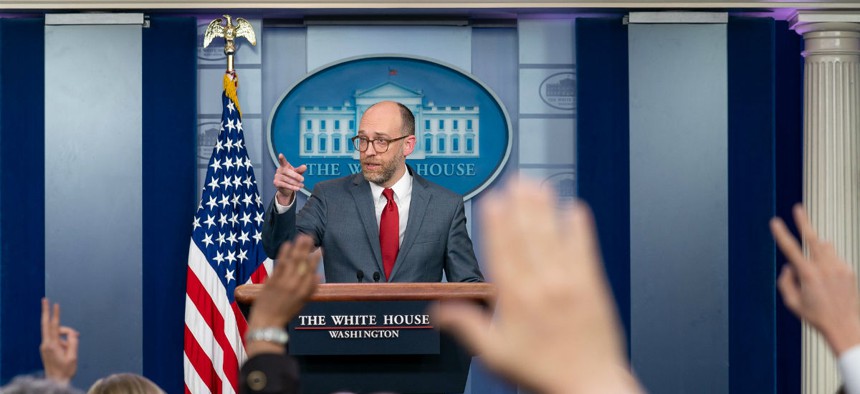
Acting Director of the Office of Management and Budget Russell Vought answers reporters questions during a press briefing on March 11. Tia Dufour/White House
OMB’s Unfinished Business on Improving Government Performance
The White House budget office has implemented Government Accountability Office recommendations at a lower rate than federal agencies governmentwide.
The Office of Management and Budget has failed to implement critical recommendations from Congress’s Government Accountability Office aimed at improving government performance.
In a compendium addressed to Mulvaney dated April 10 but released on Wednesday, GAO reported that OMB had a total of 148 open recommendations, some 20 of which it deemed priority for such key areas as program performance and data integrity. OMB’s implementation rate of 61 percent is lower than the governmentwide rate of 77 percent.
GAO credited OMB under the Trump administration with implementing, over the past year, seven of 27 priority recommendations, but proceeded to suggest a dozen more (for a new total of 31), in areas such as program inventory and information technology investments, curbing improper payments and improving fraud risk management. “Fully implementing these open recommendations could yield significant savings and other improvements in executive branch agency operations,” Comptroller General Gene Dodaro wrote.
OMB is led by acting Budget Director Russell Vought, whose boss Mick Mulvaney is serving as President Trump’s acting chief of staff.
Examples of recent successful follow-throughs are four actions to improve acquisition through category management, and promulgation of new guidance on agency use of the Treasury Department’s Do Not Pay tool to help curb improper payments.
Still more work is needed, GAO said, in areas of performance, such as on spending transparency required under the 2014 Digital Accountability and Transparency Act, on the long-vexing task of compiling an official list of qualified agency programs, and minimizing improper payments. In typical, gently-nudging language, GAO wrote: “We also want to make sure that you are aware we asked Congress to consider expanding access to the Social Security Administration’s full death file to additional agencies through the DNP working system. This proposal would allow for better data matching” to verify the names of deceased, it noted. “Likewise, we encourage you to consider this issue in developing any administration position in this regard.”
In a couple of instances, OMB officials disagreed with GAO. On a proposal to establish an interagency forum on sexual violence statistics, for example, OMB stated it did not believe a forum was the most strategic use of resources because agencies were not far enough along with their data collection efforts. “We disagree with OMB’s assertion because seven of the 10 data collection efforts have been in place for more than 10 years, and several have been in place for multiple decades,” GAO wrote.
OMB disagreed with the recommendation that it do a better job of involving chief financial officers of all agencies in a working group to support implementation of the Fraud Reduction and Data Analytics Act to more effectively share best practices.
“According to OMB staff, they believe they provided an opportunity for all agencies to attend the working group meetings,” GAO said. “Nevertheless, evidence submitted by OMB and agencies’ responses to our survey indicate that not all agencies had the opportunity to participate in the working group.”







